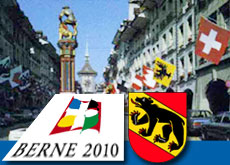Bern’s Olympic dream falters

The voters of Bern have firmly rejected plans to fund the city's 2010 Winter Olympics bid - effectively killing off the city's candidature.
Bid organisers conceded on Sunday that the refusal by voters to approve an SFr 22.5 million ($15 million) bid package would force the city to pull out of the Olympic race.
Almost four in five Bernese voted no to two Olympic related questions.
Martin Hodler, the president of Bern’s bid committee, told swissinfo he was “sad and disappointed” by the result.
“There is a certain surprise that the pessimistic attitude of the Bernese people is so strong,” Hodler said.
Hodler said voters had been scared off supporting an Olympics because of fears about the city’s finances, pension funds and the ever-burgeoning cost of the national exhibition, Expo 02.
“They really got frightened,” Hodler said.
Hodler indicated that Bern’s bid was likely to be terminated by the Bern 2010 committee at its next meeting on Friday.
Bern – which is bidding for the Winter Games for the fourth time since 1969 – has been shortlisted as one of four possible 2010 host cities, along with Vancouver (Canada), Salzburg (Austria) and South Korea’s Pyeongchang.
Bern 2010 “is dead”
Leading pro-Olympic campaigner Rolf Portmann said the result meant “the idea of Bern 2010 is dead”.
Portmann expressed surprise at the strength of the no vote, and said he hoped those who had opposed Bern’s Olympic bid would now help develop alternative strategies for the city’s future.
Dres von Weissenfluh, general director of the bid group, said there was little option but for the city to withdraw.
The Bernese were asked to decide on two issues – whether to support funding worth SFr15 million for a new ice rink in Bern and other sporting facilities in the canton, along with whether to approve credit worth SFr7.5 million for Bern 2010, the company set up to organise and promote the bid.
Hard times
Bern 2010 and its supporters appear to have failed to convince sceptical voters, despite a well-funded campaign.
Among hurdles the group failed to clear, was a Bernese population wary of funding large projects. Voters have already faced repeated calls for extra funding for the country’s troubled national exhibition, Expo.02.
In, addition, Bern’s cantonal government – one of the nation’s poorest – added to voter discontent by announcing plans to minimise the canton’s SFr11 billion debt.
In a bid to save SFr1 billion between 2003 and 2006, it intends to shed 570 jobs among civil servants, teaching staff and employees of subsidised companies in the canton.
Controversy
Bern’s bid to host the 2010 Winter Olympic Games has been dogged by controversy from the outset.
Critics claimed that Bern has neither the money nor the facilities for such an endeavour and that the city could not compete with the current favourites, Vancouver and Salzburg.
But the bid’s supporters argued that the Games would boost Bern’s importance as a centre for winter sports, as well as put the city and Switzerland firmly in the international spotlight.
Organisers estimated profits of between SFr1.4 and SFr2.6 billion from the event, which would create between 550 and 1000 jobs.
Hodler said Switzerland was unlikely to have any hope of launching a winning bid before 2018.
IOC doubts
After announcing Bern’s shortlisting, the IOC warned that the city’s bid did “not best respond to the needs of the athletes and could create significant organisational difficulties”.
Hodler said, however, that the criticisms did not mean Bern’s bid would have been doomed – pointing to critical IOC reviews of Beijing ahead of its ultimate win.
swissinfo
Almost four out of five voters in Bern reject Olympic bid financing plan.
Switzerland hosted the first winter Olympic Games in 1948.
This is Bern’s fourth bid since 1969.
Sion was defeated by Turin to host the 2006 Games.

In compliance with the JTI standards
More: SWI swissinfo.ch certified by the Journalism Trust Initiative








You can find an overview of ongoing debates with our journalists here . Please join us!
If you want to start a conversation about a topic raised in this article or want to report factual errors, email us at english@swissinfo.ch.